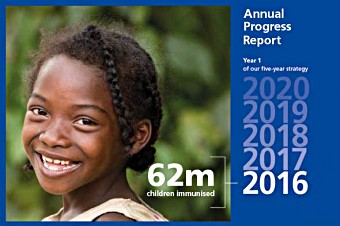2016 Report: Gavi adapting to changing global health landscape

Geneva, 17 October 2017 – In a rapidly changing global health landscape, Gavi, the Vaccine Alliance is about to face some of its toughest challenges ever, CEO Dr Seth Berkley warns in a report published today.
“Global forces such as climate change, human and animal migration, and conflict will continue to increasingly challenge our mission,” said Dr Berkley in his introduction to Gavi’s 2016 Annual Progress Report, which illustrates both the progress Gavi is making as well as the growing challenges it now faces.
Despite rising population rates, the report shows how the Alliance remains on track to reach its 2020 target of immunising 300 million children. However, it also highlights that coverage with a full course of the diphtheria-tetanus-pertussis vaccine in Gavi-supported countries appears to have stalled at 80 percent.
“To achieve our mission of ensuring that every child has equal access to life-saving vaccines, we will need to find ways to overcome these increasingly challenging global trends, and adapt accordingly,” said Dr Berkley.
To reach the ‘final fifth’ missing out on a full package of basic childhood vaccines, Gavi is switching to a more country-centric approach to better understand specific country needs. “The children we are not reaching are not just the last to be reached, they are by far the most difficult to reach,” said Dr Berkley.
Gavi is also building partnerships with private companies to find innovative ways to address obstacles to improving immunisation coverage, such as outdated supply chains and a lack of data identifying children missing out on basic vaccines.
In the context of the global challenges highlighted in the report, it will be more difficult for countries to follow in the footsteps of Bhutan, Honduras, Mongolia and Sri Lanka and transition out of Gavi support. With 16 more countries due to self-fund their immunisation systems by 2020, Gavi is helping health and finance ministers identify what it will take to build long-term sustainability.
“The focus of our new integrated set of tools and frameworks is to listen to the needs of countries so we can best support their immunisation programmes, while simultaneously tracking progress and minimising any risk,” says Gavi Board Chair Dr Okonjo-Iweala Ngozi.
The Gavi Report, the first of five through Gavi’s strategic period, is published in the second half of 2017 to incorporate critical 2016 WHO/UNICEF immunisation coverage estimates that were released last July. The data is critical to providing a complete picture of Gavi’s progress against its ambitious 2020 goals.
